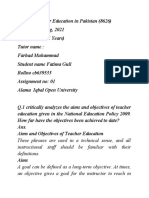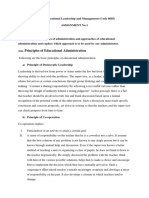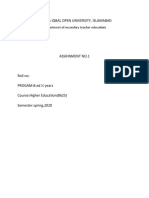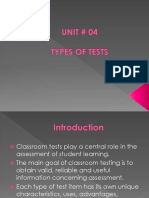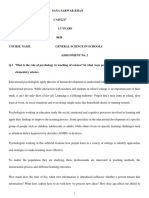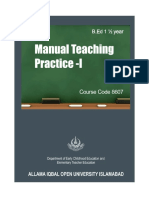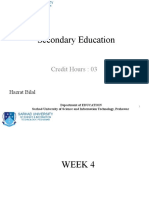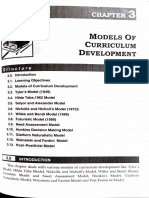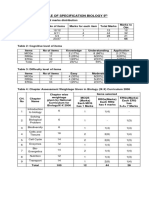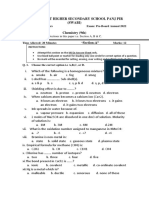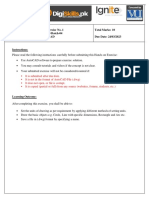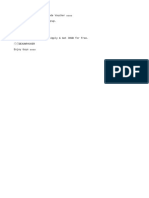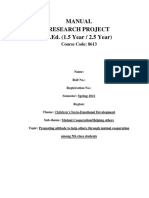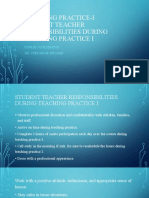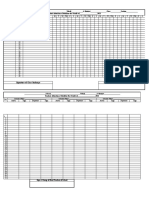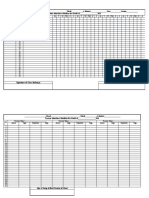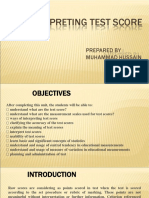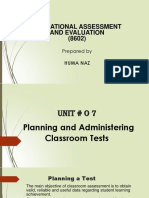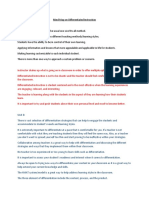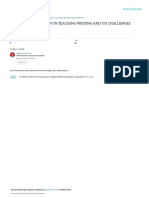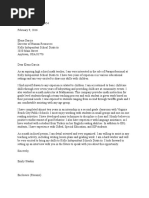0 ratings0% found this document useful (0 votes)
212 viewsProfessionalism in Teaching: Theory To Practice: Course Code: 8612 Unit 3
Professionalism in Teaching: Theory To Practice: Course Code: 8612 Unit 3
Uploaded by
Aamir HabibThis document provides an outline for a course on professionalism in teaching. It discusses the code of professional conduct and values for teachers, including respect, care, trust and integrity. It explains that professional dispositions, such as empathy and a positive view of others, are important for effective teaching. The document also notes that beginner teachers may face challenges and outlines standards for professional practice, integrity, values and relationships, and lifelong professional development.
Copyright:
© All Rights Reserved
Available Formats
Download as PPTX, PDF, TXT or read online from Scribd
Professionalism in Teaching: Theory To Practice: Course Code: 8612 Unit 3
Professionalism in Teaching: Theory To Practice: Course Code: 8612 Unit 3
Uploaded by
Aamir Habib0 ratings0% found this document useful (0 votes)
212 views20 pagesThis document provides an outline for a course on professionalism in teaching. It discusses the code of professional conduct and values for teachers, including respect, care, trust and integrity. It explains that professional dispositions, such as empathy and a positive view of others, are important for effective teaching. The document also notes that beginner teachers may face challenges and outlines standards for professional practice, integrity, values and relationships, and lifelong professional development.
Original Description:
Professionalism in Teaching chapter No.3
Original Title
8612 (U3)
Copyright
© © All Rights Reserved
Available Formats
PPTX, PDF, TXT or read online from Scribd
Share this document
Did you find this document useful?
Is this content inappropriate?
This document provides an outline for a course on professionalism in teaching. It discusses the code of professional conduct and values for teachers, including respect, care, trust and integrity. It explains that professional dispositions, such as empathy and a positive view of others, are important for effective teaching. The document also notes that beginner teachers may face challenges and outlines standards for professional practice, integrity, values and relationships, and lifelong professional development.
Copyright:
© All Rights Reserved
Available Formats
Download as PPTX, PDF, TXT or read online from Scribd
Download as pptx, pdf, or txt
0 ratings0% found this document useful (0 votes)
212 views20 pagesProfessionalism in Teaching: Theory To Practice: Course Code: 8612 Unit 3
Professionalism in Teaching: Theory To Practice: Course Code: 8612 Unit 3
Uploaded by
Aamir HabibThis document provides an outline for a course on professionalism in teaching. It discusses the code of professional conduct and values for teachers, including respect, care, trust and integrity. It explains that professional dispositions, such as empathy and a positive view of others, are important for effective teaching. The document also notes that beginner teachers may face challenges and outlines standards for professional practice, integrity, values and relationships, and lifelong professional development.
Copyright:
© All Rights Reserved
Available Formats
Download as PPTX, PDF, TXT or read online from Scribd
Download as pptx, pdf, or txt
You are on page 1of 20
Course Code: 8612
Unit 3
PROFESSIONALISM IN TEACHING: THEORY
TO PRACTICE
OUTLINES
We will learn today about:
Describe the code of
professional conduct and values
Explain the professional
dispositions for teachers
Understand the Islamic
principles of professionalism
Identify the problems faced by
beginner teachers
CODE OF PROFESSIONAL CONDUCT AND
VALUES
Professional Code for Teachers repeats and makes explicit
the values and standards that have long been experienced
by the teachers through their active participation in the field
of education.
PURPOSE OF THE CODE
It fills in as a directing compass as teachers look to control a
moral and conscious course through their career in instructing
and to maintain the respect and pride of the profession of
teaching.
It might be utilized by the teaching group and the more
extensive open to inform their comprehension and desires of
the teaching profession.
It has a vital legitimate standup and will be utilized by the
Council as a source of perspective point in practicing its
investigative and under the disciplinary capacities.
STRUCTURE OF THE CODE
This is embodied in the values of Respect, Care, Trust and
Integrity that are reflected all through the Code. All these
important values are supported by the teacher in the act of
his/her teaching profession.
PROFESSIONAL STANDARDS OF
TEACHING PROFESSION
On behalf of teaching profession, the Teaching Council
sets out the following standards that apply to all teachers
regardless of their position
CONT…….
1. Professional Values and Relationships
The Teachers should:
Be minding, reasonable and focused on the best advantages of the
students/pupil.
Regard and acknowledge the uniqueness, distinction and particular
needs of the pupils/students and improve their all-around
development.
Be focused on fairness and consideration and to regarding and
obliging diversity including those distinctions emerging from sex,
civil status, family and Status.
CONT…….
2. Professional Integrity
The Teachers should:
Act with trustworthiness and uprightness in all aspects of their
work
Respect the privacy of others and the secrecy of gained
information over the span of professional practice.
Represent themselves as role model, their professional status,
capabilities and experience genuinely
Use their name as set out in the Register of Teachers, over the span
of their expert obligations.
CONT…….
3. Professional Conduct. The Teachers should:
Uphold the respect, reputation and requirements of a profession
Take every single sensible step in connection to the care of students
under their watch to guarantee their security and welfare
Work under the premises of rules and regulation
CONT…….
4. Professional Practice : The Teachers should:
Maintain proper requirements of practice in connection to
students/pupils learning, proper planning, observing, evaluating,
reporting and giving feedback.
Apply their insight and involvement in encouraging students/pupils all
around development.
Plan and convey clear, difficult and achievable desires for students/
pupils.
Create a situation where students/pupils can play role as active agents
in the learning procedure and create deep rooted learning abilities
CONT…….
5. Professional Development. The Teachers should:
Take moral obligation regarding managing and enhancing the
nature of their professional practice by: currently keeping up their
professionally learning and comprehension to ensure it is
reflecting and basically assessing their professional practice, in
light of their professional knowledge base provide chances for
lifelong professional development.
TEACHING AS VOCATION
There is a surety that teachers can get many benefits by examination of their
important drives and duties regarding their profession.
PROFESSIONAL DISPOSITIONS
Professional dispositions are characterized as the values, duties,
and professional ethics that impact practices toward students,
families, partners, and other groups and influence students’
learning, inspiration, development and also the teacher's own
professional development.
Dispositions are guided by believes and states of mind
identified with qualities, for example, mindful, fairness,
trustworthiness, responsible, and social justice.
IMPORTANCE OF DISPOSITIONS
Research demonstrates that the properties of the classroom
teacher altogether influence how well students learn. "According
to recent studies, it has turned out to be certain that the nature
of the education our children get depends straightforwardly upon
the nature of the teachers in our schools. Guardians, teachers,
instructors, and researchers agree on that effective educating
happens when the teachers would completely know their
subjects, have solid teaching abilities and have the skill to
encourage development and learning in students
NEED OF PROFESSIONAL DISPOSITIONS
In this manner, your underlying licensure program will set you
up to show the knowledge, skills, and dispositions expected of
beginning teachers. Faculty and school staff will assess you at
different times in the program and furnish you with criticism
about your progress. Professional disposition will be evaluated
by classroom teacher in each course that has a field experience
necessity.
WAYS DISPOSITIONS MAY BE ASSESSED
An educator in one of your training classes may have a concern
about a disposition area that need to be improved. He or she
will talk about that concerns with you and you two may build
up a plan for improvement. A duplicate copy of the
improvement plan will be kept in your perpetual record and
may influence your progress in the program. Your course
teacher will report your progress, showing whether you were
or were not ready to move forward.
DISPOSITIONS OF EFFECTIVE TEACHERS
1. Empathy: Seeing and tolerating the other individual's
perspective. Trusts that a genuine grasp of the student's
perspective, and an accurate communication of that
comprehension, is a most vital key to building up a
noteworthy teaching/learning relationship.
2. Positive perspective of others: Putting believe on the
value, ability and potential of others. Believe on the trust and
confidence in the student's worth, capacity and ability with
respect to change is a vital component to learning.
CONT…….
3. Positive perspective of self: Having faith in the worth,
capacity and potential of themselves. Having a built up self-
idea that is generally positive and gives a general feeling of
self-adequacy.
4. Authenticity: Feeling a sense of opportunity and openness
that empowers her or him to be an interesting individual in
trustworthiness and pureness.
5. Meaningful purpose and vision: Identifying to purposes
that are essentially individual focused, wide, deep, freeing
and long range in nature.
QUESTIONS
You might also like
- Question 4Document4 pagesQuestion 4andualem ayeleNo ratings yet
- Philosophy of Education: (Written As A Handout For MALT 601: Foundations of Education)Document22 pagesPhilosophy of Education: (Written As A Handout For MALT 601: Foundations of Education)Delfin ValdezNo ratings yet
- 8605 PDFDocument248 pages8605 PDFAbeera Hassan Chohan83% (6)
- Q. 1 Why Is A Model of Teaching Needed? What Approaches Are Used in Building Model of Teaching?Document25 pagesQ. 1 Why Is A Model of Teaching Needed? What Approaches Are Used in Building Model of Teaching?rameezarana100% (1)
- 6 Weeks Teaching Practice Completion Certificate For BDocument1 page6 Weeks Teaching Practice Completion Certificate For BAamir Habib100% (1)
- Contextualized DLL Grade 10 Math Based On Planting of RiceDocument3 pagesContextualized DLL Grade 10 Math Based On Planting of RiceRoline Julaton100% (1)
- Professionalism in Teaching (8612) 2nd Assignment-1Document41 pagesProfessionalism in Teaching (8612) 2nd Assignment-1israrullah548No ratings yet
- Unit 1 8626Document28 pagesUnit 1 8626Neelam ZahraNo ratings yet
- Describe Professionalism in Islam. Also Discuss I...Document2 pagesDescribe Professionalism in Islam. Also Discuss I...inam rehmanNo ratings yet
- Combined 8609Document304 pagesCombined 8609hajraNo ratings yet
- Field Notes School LeadershipDocument2 pagesField Notes School LeadershipTOP TEN 10No ratings yet
- 8626Document49 pages8626S N BalochNo ratings yet
- Best Approach for Content Organization in PakistanDocument2 pagesBest Approach for Content Organization in Pakistanmemoonadilawarkhan100% (1)
- Educational Leadership and Management 8605Document19 pagesEducational Leadership and Management 8605ashrafNo ratings yet
- Assignment Solution 8610Document16 pagesAssignment Solution 8610Haroon Karim BalochNo ratings yet
- Israr Educational Philosophy (8609) 2nd AssignmentDocument36 pagesIsrar Educational Philosophy (8609) 2nd Assignmentisrarullah548No ratings yet
- Q.No: 1 Explain The Relationship of Ethics and Education - What The Responsibilities of A Teacher in This Regard? AnsDocument23 pagesQ.No: 1 Explain The Relationship of Ethics and Education - What The Responsibilities of A Teacher in This Regard? Ansشکیل احمدNo ratings yet
- Contemporary Philosophies and Curriculum Development: Unit-8Document22 pagesContemporary Philosophies and Curriculum Development: Unit-8Atiq Ur-RahmanNo ratings yet
- Classroom Management EDU 206Document3 pagesClassroom Management EDU 206Syed Muhammad Aamir0% (2)
- Allama Iqbal Open University, Islamabad: (Department of Secondary Teacher Education)Document8 pagesAllama Iqbal Open University, Islamabad: (Department of Secondary Teacher Education)Shakeel BalochNo ratings yet
- Interpreting Test ScoresDocument26 pagesInterpreting Test Scoresmaheen rasheedNo ratings yet
- 8603 BedDocument2 pages8603 BedM Imran100% (2)
- Assignment No.1 - 8612 - Autumn 2023 - 0000401127 - Syed Ali Saboor ZaidiDocument14 pagesAssignment No.1 - 8612 - Autumn 2023 - 0000401127 - Syed Ali Saboor ZaidiAli SaboorNo ratings yet
- 8603 AssignmentDocument13 pages8603 AssignmentQaiser KhanNo ratings yet
- Assignment # 1 NAME:Mohsin Raza CODE:BZ664692 CODE:8623 Allama Iqbal Open University IslamabadDocument23 pagesAssignment # 1 NAME:Mohsin Raza CODE:BZ664692 CODE:8623 Allama Iqbal Open University IslamabadNimra KhurramNo ratings yet
- 8610 Important Questions A23 M.JABERDocument29 pages8610 Important Questions A23 M.JABERsadiakhalid5802013100% (1)
- 8603 CodeDocument17 pages8603 CodeFarhan PhotoState & ComposingNo ratings yet
- Organizational Behavior (5007) : Allama Iqbal Open University, Islamabad (Department of Business Administration)Document7 pagesOrganizational Behavior (5007) : Allama Iqbal Open University, Islamabad (Department of Business Administration)Aiou MSCNo ratings yet
- Anila 8611Document18 pagesAnila 8611Anila zafarNo ratings yet
- 8605 Important Questions A23 M.jabeRDocument30 pages8605 Important Questions A23 M.jabeRisabella99No ratings yet
- You Are Here: Mix A Little Salt and Olive Oil and Say Goodbye To Joint PainDocument43 pagesYou Are Here: Mix A Little Salt and Olive Oil and Say Goodbye To Joint PainNavid KhanNo ratings yet
- Planning For DiscussionDocument3 pagesPlanning For DiscussionYunissa AdelaNo ratings yet
- 8624 Important Questions A23 M.jabeRDocument27 pages8624 Important Questions A23 M.jabeRAmmara BibiNo ratings yet
- Allama Iqbal Open University Assignment N0 02: Submitted By: Hammad QayyumDocument11 pagesAllama Iqbal Open University Assignment N0 02: Submitted By: Hammad Qayyumraja sohaib qayyumNo ratings yet
- 2 Factor Affecting Program For Universal LiteracyDocument9 pages2 Factor Affecting Program For Universal LiteracyFaisal RehmanNo ratings yet
- Unit 04 8602Document23 pagesUnit 04 8602maheen rasheedNo ratings yet
- 8638 Assignment 2Document27 pages8638 Assignment 2Salman Khan LohaniNo ratings yet
- Assignment No. 1 Q. 1 Discuss in Detail The Relationship of Quran, Hadith and Modern ScienceDocument14 pagesAssignment No. 1 Q. 1 Discuss in Detail The Relationship of Quran, Hadith and Modern ScienceChemo PhobiaNo ratings yet
- 8603 Guess Paper-1 - UnlockedDocument82 pages8603 Guess Paper-1 - Unlockedqasim kayaniNo ratings yet
- 8626 Assignment. 1Document21 pages8626 Assignment. 1Muhammad Zakria100% (1)
- 8607 Field Notes-2Document39 pages8607 Field Notes-2Wasim SajjadNo ratings yet
- 8603-2 Autumn 2018Document11 pages8603-2 Autumn 2018Muhammad Asim Hafeez ThindNo ratings yet
- Curriculum Development: Submitted By: Ayesha Khalid Assignment Number 1 B.ED 1.5 YearDocument20 pagesCurriculum Development: Submitted By: Ayesha Khalid Assignment Number 1 B.ED 1.5 YearAyesha KhalidNo ratings yet
- Comparison Between Public and Private Sectors For The Provision of Co-Curricular Activities (Muhammad Ayub)Document64 pagesComparison Between Public and Private Sectors For The Provision of Co-Curricular Activities (Muhammad Ayub)Muhammad Nawaz Khan AbbasiNo ratings yet
- 8624 Assignment No 1Document33 pages8624 Assignment No 1Asad ullahNo ratings yet
- Secondary Education in PakistanDocument11 pagesSecondary Education in PakistanMohsin IqbalNo ratings yet
- Interpreting The Test Score: Prepared By: Amjad IqbalDocument17 pagesInterpreting The Test Score: Prepared By: Amjad IqbalAltaf Ullah100% (2)
- Dr. Arbab Afridi (Method of Teaching English)Document2 pagesDr. Arbab Afridi (Method of Teaching English)Muhammad Nawaz Khan AbbasiNo ratings yet
- Curriculum ModelsDocument15 pagesCurriculum ModelsGoutam Kumar SinghNo ratings yet
- Classroom Incentive SystemDocument2 pagesClassroom Incentive Systemapi-324338437100% (1)
- 8603 1 PDFDocument10 pages8603 1 PDFZebiButt100% (1)
- Curriculum Development in PakistanDocument29 pagesCurriculum Development in PakistanHina KaynatNo ratings yet
- 8612 Assignment 1 Ali Faizur RehmanDocument13 pages8612 Assignment 1 Ali Faizur RehmanAli Faizur RehmanNo ratings yet
- Role and Responsibility of A TeacherDocument4 pagesRole and Responsibility of A TeacherBrian Mukomango100% (1)
- 8613 Autumn 2024 TopicsDocument17 pages8613 Autumn 2024 TopicsmoonlitbazarNo ratings yet
- Allama Iqbal Open University, Islamabad: (Department of Educational Planning, Policy Studies & Leadership)Document3 pagesAllama Iqbal Open University, Islamabad: (Department of Educational Planning, Policy Studies & Leadership)ubaid sajidNo ratings yet
- Allama Iqbal Open University, Islamabad: Course: Human Resource Management (9504) Semester: Autumn 2020 Level: PGDDocument7 pagesAllama Iqbal Open University, Islamabad: Course: Human Resource Management (9504) Semester: Autumn 2020 Level: PGDilyas muhammadNo ratings yet
- 8614 Statitics Unit 1Document61 pages8614 Statitics Unit 1Sadar Ali100% (2)
- Teacher Education and LicencingDocument5 pagesTeacher Education and LicencingCikguAmeliaNo ratings yet
- Teaching Profession and Teachers Professional Developmen1Document23 pagesTeaching Profession and Teachers Professional Developmen1zr24431No ratings yet
- The Teaching ProfessionDocument173 pagesThe Teaching ProfessionKatrine ManaoNo ratings yet
- Q.1 Explain The Concept of Profession. Discuss Teaching As Profession. Concept of Profession: The Word "Profession" Means Different Things To Different PeopleDocument8 pagesQ.1 Explain The Concept of Profession. Discuss Teaching As Profession. Concept of Profession: The Word "Profession" Means Different Things To Different PeopleSajjad Ahmad100% (1)
- 8612 Assignment 01 AwaisDocument28 pages8612 Assignment 01 AwaisawaisNo ratings yet
- 3rd EnglishDocument2 pages3rd EnglishAamir HabibNo ratings yet
- Chemistry 9Document2 pagesChemistry 9Aamir HabibNo ratings yet
- Biology 9th Specs 1 PDFDocument1 pageBiology 9th Specs 1 PDFAamir HabibNo ratings yet
- 1263 Special Summer Task To DEO OfficesDocument1 page1263 Special Summer Task To DEO OfficesAamir HabibNo ratings yet
- Action PlanDocument2 pagesAction PlanAamir HabibNo ratings yet
- 9th Class Annual Chemistry Paper Group B New PDFDocument2 pages9th Class Annual Chemistry Paper Group B New PDFAamir HabibNo ratings yet
- 9th Class Annual Chemistry Paper Group BDocument3 pages9th Class Annual Chemistry Paper Group BAamir HabibNo ratings yet
- DSTP2.0-Batch-04 ATC101 1Document3 pagesDSTP2.0-Batch-04 ATC101 1Aamir HabibNo ratings yet
- 6499 Lesson PlanDocument160 pages6499 Lesson PlanAamir HabibNo ratings yet
- WindScribe 30GB Reedem Code VoucherDocument1 pageWindScribe 30GB Reedem Code VoucherAamir Habib100% (1)
- PST Male SwabiDocument93 pagesPST Male SwabiAamir HabibNo ratings yet
- Final Lesson PlansDocument10 pagesFinal Lesson PlansAamir HabibNo ratings yet
- UNIT-3 Intellectual DevelopmentDocument58 pagesUNIT-3 Intellectual DevelopmentAamir HabibNo ratings yet
- Promoting Attitude To Help Other Through Mutual Cooperation Among 5th Class StudentsDocument22 pagesPromoting Attitude To Help Other Through Mutual Cooperation Among 5th Class StudentsAamir HabibNo ratings yet
- 40 Lesson PlansDocument109 pages40 Lesson PlansAamir HabibNo ratings yet
- 8607 Teaching Practice-I: Course Coordinator: Dr. Syed Nasir HussainDocument23 pages8607 Teaching Practice-I: Course Coordinator: Dr. Syed Nasir HussainAamir HabibNo ratings yet
- Teaching Practice-I Student Teacher Responsibilities During Teaching Practice IDocument20 pagesTeaching Practice-I Student Teacher Responsibilities During Teaching Practice IAamir HabibNo ratings yet
- Course Code 8610 Human Development and Learning Course Code 8610 Human Development and LearningDocument53 pagesCourse Code 8610 Human Development and Learning Course Code 8610 Human Development and LearningAamir HabibNo ratings yet
- Learning Science: Unit 4 BY Atika AbidDocument22 pagesLearning Science: Unit 4 BY Atika AbidAamir HabibNo ratings yet
- Unit 7 Prepared By: Atika AbidDocument27 pagesUnit 7 Prepared By: Atika AbidAamir HabibNo ratings yet
- Introduction of Profession and Concept of Teaching: Course Code: 8612 Unit 1Document19 pagesIntroduction of Profession and Concept of Teaching: Course Code: 8612 Unit 1Aamir HabibNo ratings yet
- Teaching of Science Concepts: Unit 9 Prepared: ATIKA ABIDDocument24 pagesTeaching of Science Concepts: Unit 9 Prepared: ATIKA ABIDAamir HabibNo ratings yet
- Signature of Class Incharge Sign & Stamp of Head Teacher of SchoolDocument2 pagesSignature of Class Incharge Sign & Stamp of Head Teacher of SchoolAamir HabibNo ratings yet
- 8608 Attendance Record and Completion CertificateDocument3 pages8608 Attendance Record and Completion CertificateAamir HabibNo ratings yet
- 8609 Philosophy of Education Assignment No.1Document19 pages8609 Philosophy of Education Assignment No.1Aamir HabibNo ratings yet
- 8601 5 Activity Method by AhmedDocument32 pages8601 5 Activity Method by AhmedAamir HabibNo ratings yet
- General Methods of Teaching: CODE NO. 8601 B.Ed Program Dr. Shaista Majid Assistant ProfessorDocument33 pagesGeneral Methods of Teaching: CODE NO. 8601 B.Ed Program Dr. Shaista Majid Assistant ProfessorAamir HabibNo ratings yet
- Unit 8..8602 PDFDocument47 pagesUnit 8..8602 PDFAamir HabibNo ratings yet
- Unit 7Document26 pagesUnit 7Aamir HabibNo ratings yet
- Study of Values Among School Teachers Across Teachers and School Management StyleDocument6 pagesStudy of Values Among School Teachers Across Teachers and School Management StyleAndra ModreanuNo ratings yet
- Mind Map On Differentiated InstructionDocument2 pagesMind Map On Differentiated Instructionapi-532859914No ratings yet
- 3.1 Recognise Words in Linear and Non-Linear Texts by Using Knowledge of Sounds of LettersDocument1 page3.1 Recognise Words in Linear and Non-Linear Texts by Using Knowledge of Sounds of LettersNOR AFIFAH BINTI MAZLAN MoeNo ratings yet
- Reflective Lesson Plan 2 Adding and Subtracting DecimalsDocument11 pagesReflective Lesson Plan 2 Adding and Subtracting DecimalsAlfred Cedrix BornelNo ratings yet
- RecordedCourseCatalog2016 2017Document153 pagesRecordedCourseCatalog2016 2017Homeschool ConnectionsNo ratings yet
- HG5 - Q3 - Week1 Module7 January 19 2024 WARNING Safety FirstDocument4 pagesHG5 - Q3 - Week1 Module7 January 19 2024 WARNING Safety FirstBea Katrine NavaseroNo ratings yet
- Unit 6Document22 pagesUnit 6Julian CaballeroNo ratings yet
- 2019 - Csusm Gmail Email Resume I Placed On Weebly With Better ObjectiveDocument2 pages2019 - Csusm Gmail Email Resume I Placed On Weebly With Better Objectiveapi-406769716No ratings yet
- Job DescriptionDocument3 pagesJob DescriptionJorge TinayaNo ratings yet
- Chapter 6 Curriculum ImplementationDocument26 pagesChapter 6 Curriculum ImplementationMaKenJi100% (5)
- Citation 1 2024Document24 pagesCitation 1 2024ERNIE CERADONo ratings yet
- Model KouninDocument32 pagesModel KouninAbdul Ghaffar JaafarNo ratings yet
- Robles Castaneda Noe Equity Audit PresentationDocument12 pagesRobles Castaneda Noe Equity Audit Presentationapi-547598563No ratings yet
- Code 829 Assignment 1Document17 pagesCode 829 Assignment 1asad0% (1)
- Peabody School HomeworkDocument6 pagesPeabody School Homeworkewbndw35No ratings yet
- The Development and Testing of Preschool Bahasa Malaysia Reading Intervention Module Using MultimediaDocument4 pagesThe Development and Testing of Preschool Bahasa Malaysia Reading Intervention Module Using Multimediarahmatulhusni484No ratings yet
- Fiction Vs Nonfiction Lesson PlanDocument2 pagesFiction Vs Nonfiction Lesson Planapi-636545998100% (1)
- Jones Staff Letters of RecommendationDocument2 pagesJones Staff Letters of Recommendationapi-256004886No ratings yet
- Scaffolding Strategy in Teaching Writing and Its Challenges: March 2021Document10 pagesScaffolding Strategy in Teaching Writing and Its Challenges: March 2021Love DahliaNo ratings yet
- Staskin Cover LetterDocument3 pagesStaskin Cover Letterapi-296415389No ratings yet
- Textbook Analysis DefinitionDocument12 pagesTextbook Analysis DefinitionLatifah Wayne100% (4)
- Global Education and Global TeacherDocument8 pagesGlobal Education and Global Teachergrecil castilloNo ratings yet
- Ictd Applications in Core SectorsDocument29 pagesIctd Applications in Core SectorsBrightson Tom100% (3)
- Mechanisms Employed by Heads of Public Secondary Schools To Control Teaching and Learning Activities in Bukombe District, Geita, TanzaniaDocument12 pagesMechanisms Employed by Heads of Public Secondary Schools To Control Teaching and Learning Activities in Bukombe District, Geita, TanzaniaPoonam KilaniyaNo ratings yet
- Module 7 - Lesson 3Document4 pagesModule 7 - Lesson 3Magievelle TubilloNo ratings yet
- Kibet PeterDocument201 pagesKibet Petermary joy fajardoNo ratings yet
- Effect On The Attendance of Students After The Home VisitationDocument12 pagesEffect On The Attendance of Students After The Home Visitationaaron davidNo ratings yet
- Format For Lesson Plan: General ObjectiveDocument2 pagesFormat For Lesson Plan: General ObjectiveDelphy VargheseNo ratings yet











